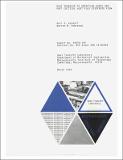Heat transfer to impacting drops and post critical heat flux dispersed flow
Author(s)
Kendall, Gail E.; Rohsenow, Warren M.
DownloadHTL_TR_1978_100.pdf (9.114Mb)
Other Contributors
Massachusetts Institute of Technology. Division of Sponsored Research.
Massachusetts Institute of Technology. Dept. of Mechanical Engineering.
Massachusetts Institute of Technology. Heat Transfer Laboratory.
Metadata
Show full item recordAbstract
Heat transfer to drops impacting on a hot surface is examined in context of dispersions of flowing, boiling fluids. The liquid contribution to heat transfer from a hot tube to a two-phase dispersion is formulated in terms of heat transfer contributions due to surface impacts of individual drops. High heat transfer rates are associated with liquid wetting of the surface at surface temperatures between saturation and the minimum stable film boiling (transition) temperature. Low heat transfer rates are associated with non-wetting, or dry, impacts at surface temperatures above the transition temperature. In the wetting region, experimental measurements of heat transfer rates to sparse streams of drops impacting on a hot surface showed complete evaporation of the drops. In the non-wetting region, an analysis of impact dynamics and heat transfer for deformable drops was performed using simple, idealized shapes to model the deformation. Lagrangian methods were used to derive equations of motion and deformation for impacting drops. Resulsts compare well with available information on drop dynamics and heat transfer. The analysis of heat transfer to impacting drops was formulated for incorporation into dispersed flow analysis, given the statistical distribution of drops in the dispersion. Applications include the prediction of local heat transfer and vapor generation rates. The liquid contribution to dispersed flow heat transfer must be included for the prediction of rewet in nonuniformly heated tubes.
Date issued
1978Publisher
Cambridge, Mass. : Heat Transfer Laboratory, Dept. of Mechanical Engineering, Massachusetts Institute of Technology, [1978]
Other identifiers
10849096
Series/Report no.
Technical report (Massachusetts Institute of Technology, Heat Transfer Laboratory) ; no. 100.